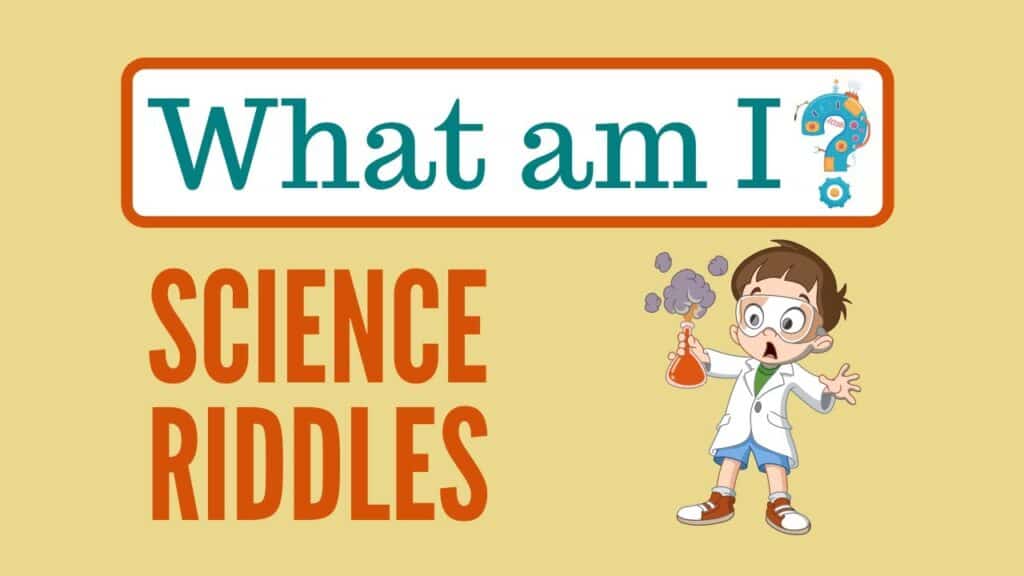Looking for a fun way to challenge your brain?
Science riddles are the perfect mix of entertainment and learning, but finding good ones can be tough. You might spend hours searching only to find too easy or not very interesting riddles. Well, get ready to put your thinking cap on!
We’ve compiled an amazing collection of 171+ science riddles that will boggle your mind and make you smile.
Whether you’re a science enthusiast or love a good mental challenge, you’ll find plenty of riddles here to keep your curious mind engaged and delighted.
Let’s dive in!
Top Science Riddles to Test Your Problem-Solving Skills

Physics Riddles
-
What can be as fast as light but never move?
A shadow. -
I can be broken without being held. What am I?
A promise. -
What does not get any wetter, no matter how much it rains?
The sea. -
I exist when you measure me, but if you stop measuring, I cease to exist. What am I?
Time. -
The more you take, the more you leave behind. What am I?
Footsteps. -
I am not alive, but I grow; I don’t have lungs, but I need air; I don’t have a mouth, but water kills me. What am I?
Fire. -
What goes up but never comes down?
Your age. -
I travel around the world but stay in one corner. What am I?
A stamp. -
What has keys but can’t open locks?
A piano. -
I am light as a feather, yet the strongest man can’t hold me for more than 5 minutes. What am I?
Breath. -
What can fill a room but take up no space?
Light. -
What is invisible, but can you still see it?
A reflection. -
The more you take away from me, the bigger I become. What am I?
A hole. -
What comes once in a minute, twice in a moment, but never in a thousand years?
The letter ‘M’. -
I can fly without wings. I can cry without eyes. Wherever I go, darkness flies. What am I?
A cloud. -
What can be cracked, made, told, and played?
A joke. -
What gets sharper the more you use it?
Your brain. -
What has a head and a tail but does not have a body?
A coin. -
What is always in front of you but can’t be seen?
The future. -
What has cities but no houses, forests, trees, and rivers but no water?
A map. -
What has a bottom at the top?
Your legs. -
What has no weight can be seen by the naked eye, and if you put it in a barrel, it makes the barrel lighter.
A hole. -
What can go up a chimney but can’t go down a chimney?
An umbrella. -
What is harder to catch the faster you run?
Your breath. -
What can you hold in your right hand but never in your left hand?
Your left hand.
Chemistry Riddles
-
I can be found in you; I’m a metal that’s blue. What am I?
Copper. -
What element is derived from a Norse god?
Thorium. -
What chemical element is also the name of a planet?
Mercury. -
What happens when you combine sodium with chlorine?
Table salt (sodium chloride). -
I can be used to kill bacteria and also used to whiten clothes. What am I?
Bleach. -
What element helps you shine in the dark?
Phosphorus. -
I can power a light bulb and also be used to make a bomb. What am I?
Uranium. -
What is the most abundant element in the universe?
Hydrogen. -
What is a common substance that is made from the combination of two dangerous elements, sodium and chlorine?
Table salt. -
What is H2O more commonly known as?
Water. -
I am a compound made of oxygen and hydrogen, but I’m not water. What am I?
Hydrogen peroxide (H2O2). -
What gas do plants absorb from the atmosphere?
Carbon dioxide. -
What element is named after the Greek word for green?
Chlorine. -
I am the most electronegative element. What am I?
Fluorine. -
What element is the primary component of diamonds?
Carbon. -
What is the only metal that is liquid at room temperature?
Mercury. -
I am made of two elements and can make your soda fizzy. What am I?
Carbon dioxide. -
What gas is essential for human respiration?
Oxygen. -
What element is known for its use in pencils?
Graphite (Carbon). -
What is the chemical symbol for gold?
Au. -
What common kitchen item is made from sodium bicarbonate?
Baking soda. -
I am a colorless, odorless gas used in balloons to make them float. What am I?
Helium. -
What is the chemical symbol for water?
H2O. -
What element is a key component of the Earth’s atmosphere and is necessary for combustion?
Oxygen. -
What is the lightest and most abundant element in the universe?
Hydrogen.
Biology Riddles
-
What is the powerhouse of the cell?
Mitochondria. -
What type of blood cells fight infection?
White blood cells. -
What process do plants use to make their food?
Photosynthesis. -
What is the largest organ in the human body?
Skin. -
What organ is responsible for pumping blood throughout the body?
The heart. -
What part of the plant conducts photosynthesis?
The leaves. -
What type of organism is a mushroom?
Fungus. -
What is the genetic material in a cell called?
DNA. -
What structure protects the brain?
The skull. -
What type of blood cell carries oxygen?
Red blood cells. -
What is the main function of the roots of a plant?
To absorb water and nutrients. -
What is the human body’s largest muscle?
The gluteus maximus. -
What part of the cell contains the genetic material?
The nucleus. -
What kind of animal lays eggs but is not a bird?
Reptile. -
What is the smallest bone in the human body?
The stapes (in the ear). -
What type of cells are involved in the immune response?
White blood cells. -
What part of the brain controls balance and coordination?
The cerebellum. -
What is the main function of the large intestine?
To absorb water from indigestible food matter. -
What organ in the human body is responsible for filtering blood?
The kidneys. -
What is the primary function of red blood cells?
To carry oxygen to the body’s tissues. -
What is the study of plants called?
Botany. -
What organ produces insulin?
The pancreas. -
What type of blood vessel carries blood away from the heart?
Arteries. -
What is the largest type of deer?
Moose. -
What organ is responsible for producing bile?
The liver.
Earth Science Riddles
-
What do you call molten rock beneath the earth’s surface?
Magma. -
What is the process by which water vapor becomes liquid water?
Condensation. -
What type of rock is formed from volcanic activity?
Igneous rock. -
What is the term for the movement of continents over time?
Plate tectonics. -
What is the natural satellite of Earth?
The Moon. -
What is the process of breaking down rocks into smaller pieces called?
Weathering. -
What is the innermost layer of the Earth called?
The core. -
What do you call the preserved remains of ancient organisms?
Fossils. -
What is the name of the supercontinent that existed millions of years ago?
Pangaea. -
What is the term for water that falls from clouds to the Earth’s surface?
Precipitation. -
What is the most abundant gas in the Earth’s atmosphere?
Nitrogen. -
What type of rock is formed from compacted sediment?
Sedimentary rock. -
What is the outermost layer of the Earth called?
The crust. -
What natural disaster is caused by the sudden movement of Earth’s plates?
Earthquake. -
What is the term for the continuous movement of water on, above, and below the Earth’s surface?
The water cycle. -
What is the term for the place where an earthquake starts?
The epicenter. -
What is the term for molten rock that reaches the Earth’s surface?
Lava. -
What is the process by which plants release water vapor into the air?
Transpiration. -
What do you call the solid outer layer of the Earth?
The lithosphere. -
What is the name of the largest ocean on Earth?
The Pacific Ocean. -
What is the term for the periodic rise and fall of sea levels?
Tides. -
What is the process by which sediment is removed from its source and transported to another location?
Erosion. -
What is the term for a mountain that forms from the buildup of volcanic materials?
A volcano. -
What is the term for the remains of plants and animals that lived millions of years ago and have been preserved in rock?
Fossils. -
What is the term for the force exerted by the weight of the atmosphere?
Atmospheric pressure.
Space and Astronomy Riddles
-
What is the largest planet in our solar system?
Jupiter. -
What is the term for a star that suddenly increases in brightness and then fades?
A nova. -
What galaxy is Earth located in?
The Milky Way. -
What is the closest planet to the Sun?
Mercury. -
What is the term for a rock that enters Earth’s atmosphere and burns up?
A meteor. -
What is the term for the remains of a star that has exploded in a supernova?
A neutron star. -
What is the name of the telescope launched into space by NASA in 1990?
The Hubble Space Telescope. -
What planet is known as the Red Planet?
Mars. -
What is the term for a large group of stars, gas, and dust bound together by gravity?
A galaxy. -
What is the term for the path that a planet takes around the Sun?
An orbit. -
What is the name of the closest star to Earth?
The Sun. -
What is the term for a system of millions or billions of stars?
A galaxy. -
What is the second largest planet in our solar system?
Saturn. -
What is the term for a celestial body that orbits a planet?
A moon. -
What is the term for the study of the universe beyond Earth’s atmosphere?
Astronomy. -
What is the term for the brightness of a star as seen from Earth?
Apparent magnitude. -
What planet is known for its rings?
Saturn. -
What is the term for a giant cloud of gas and dust in space?
A nebula. -
What is the term for a small, icy body that orbits the Sun and has a tail?
A comet. -
What is the term for a star system with two stars?
A binary star system. -
What is the term for the force that keeps planets in orbit around the Sun?
Gravity. -
What is the name of the largest moon of Jupiter?
Ganymede. -
What is the term for the distance light travels in one year?
A light-year. -
What is the term for a region of space where the gravitational pull is so strong that nothing can escape?
A black hole. -
What is the term for a sudden burst of energy from the Sun’s surface?
A solar flare.
Advanced Science Riddles
-
What is the term for the rate of change of velocity?
Acceleration. -
What is the term for a change in the direction of a wave when it passes from one medium to another?
Refraction. -
What is the term for the energy an object has due to its motion?
Kinetic energy. -
What is the term for the energy stored in an object due to its position or state?
Potential energy. -
What is the term for the force that opposes the motion of an object through a fluid?
Drag. -
What is the term for the bending of light as it passes around an object?
Diffraction. -
What is the term for the tendency of an object to resist changes in its state of motion?
Inertia. -
What is the term for the transfer of heat through a fluid?
Convection. -
What is the term for the transfer of energy by electromagnetic waves?
Radiation. -
What is the term for the amount of matter in an object?
Mass. -
What is the term for the resistance of a fluid to flow?
Viscosity. -
What is the term for the amount of space an object occupies?
Volume. -
What is the term for the number of protons in the nucleus of an atom?
Atomic number. -
What is the term for the measure of the average kinetic energy of the particles in a substance?
Temperature. -
What is the term for the force that acts between charged particles?
Electrostatic force. -
What is the term for the tendency of a fluid to resist flow?
Viscosity. -
What is the term for the amount of energy required to raise the temperature of one gram of a substance by one degree Celsius?
Specific heat capacity. -
What is the term for the process by which plants convert sunlight into chemical energy?
Photosynthesis. -
What is the term for the amount of energy required to change the state of a substance from solid to liquid at its melting point?
Heat of fusion. -
What is the term for the process by which cells obtain energy from glucose?
Cellular respiration. -
What is the term for the process by which a liquid changes into a gas?
Evaporation. -
What is the term for the amount of energy required to change the state of a substance from liquid to gas at its boiling point?
Heat of vaporization. -
What is the term for the measure of the amount of solute dissolved in a solvent?
Concentration. -
What is the term for the measure of the amount of oxygen needed by bacteria to break down organic matter in water?
Biological oxygen demand. -
What is the term for the process by which green plants produce their food using sunlight?
Photosynthesis.
Fun Science Facts and Trivia
-
What is the term for the study of living organisms?
Biology. -
What is the term for the study of the structure and function of the human body?
Anatomy. -
What is the term for the study of the mind and behavior?
Psychology. -
What is the term for the study of the origin, evolution, and structure of the universe?
Cosmology. -
What is the term for the study of the Earth and its processes?
Geology. -
What is the term for the study of the properties and behavior of matter?
Chemistry. -
What is the term for the study of forces and energy?
Physics. -
What is the term for the study of the interaction of organisms with their environment?
Ecology. -
What is the term for the study of the nervous system and its disorders?
Neurology. -
What is the term for the study of ancient life through the examination of fossils?
Paleontology. -
What is the term for the study of the structure and function of cells?
Cell biology. -
What is the term for the study of the chemical processes within and relating to living organisms?
Biochemistry. -
What is the term for the study of the genetic composition of populations and how it changes over time?
Population genetics. -
What is the term for the study of diseases and their causes?
Pathology. -
What is the term for the study of the immune system and immune responses?
Immunology. -
What is the term for the study of weather and climate?
Meteorology. -
What is the term for the study of the properties of numbers and the relationships between them?
Mathematics. -
What is the term for the study of human societies and cultures?
Anthropology. -
What is the term for the study of the physical structure and substance of the Earth?
Geology. -
What is the term for the study of the function of living organisms and their parts?
Physiology. -
What is the term for the study of the inheritance and variation of traits in organisms?
Genetics. -
What is the term for the study of the behavior of light and other forms of electromagnetic radiation?
Optics. -
What is the term for the study of sound and its properties?
Acoustics. -
What is the term for the study of heat and temperature?
Thermodynamics. -
What is the term for the study of the composition, structure, properties, and reactions of matter?
Chemistry.
Conclusion
You’ve just finished an amazing collection of 171+ science riddles that cover a wide range of topics, from physics and chemistry to biology and space.
These riddles test your knowledge and make learning about science fun and engaging. By working through these puzzles, you’ve given your brain a good workout and gained a better understanding of the world around you.
So, what should you do next? Keep exploring!
Science is a vast and exciting field with many more mysteries waiting to be solved. Share these riddles with others who enjoy a good challenge, and don’t forget to check out our other articles for more fascinating science content.
The key is never to stop asking questions and seeking answers.
Happy exploring!


















